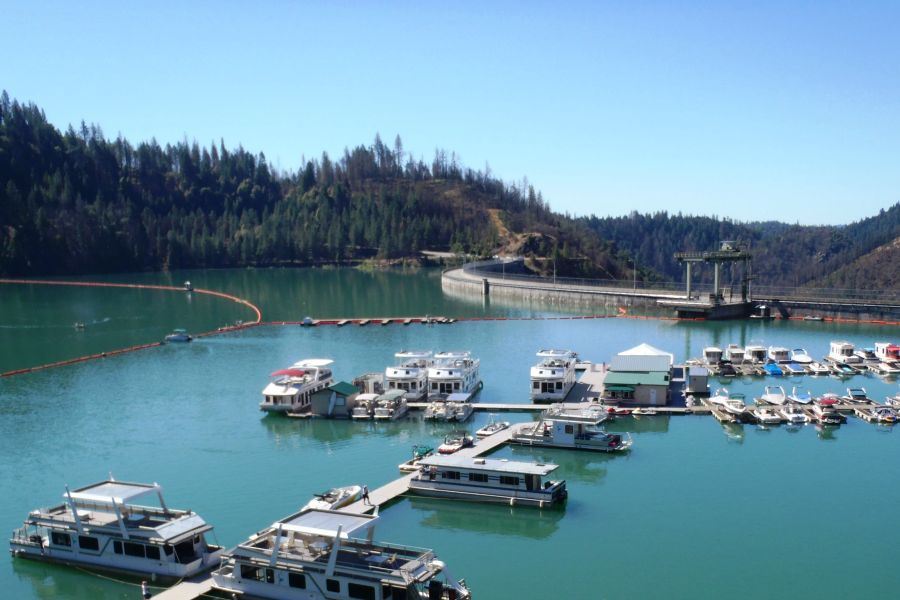
As a houseboat liveaboard, you already have a house but it isn’t a home until you find a safe and pleasant place to anchor or dock it. Usually that’s a good thing. You’re free to follow the sun or simply sail away from noisy neighbors. On the other hand, there are good reasons to buy a berth that will be all your own.
Dock space can be an excellent real estate investment. Waterfront property can grow or even skyrocket in value. Your dock might even bring in rental income when you’re out cruising. You own it, so you can come and go as you wish. No reservations. No blackout dates. As a member of an owners’ association, you’ll also have a say in how the marina, condo or club is operated.
Most docks found online on the for sale list are 30 feet or smaller, so the first challenge is to find one large enough for your houseboat. Water routes in and out must be deep enough, wide enough and high enough for your boat.
If the dock is in a land-locked lake, the real estate risk/reward is somewhat different. As the old saying goes, “They can print money, but they can’t print more land.” When the entire shoreline is sold out, values zoom. If the lake goes dry, prices may plunge.
Once you have a list of basic requirements the search begins. Some online real estate services specialize in boat berths, but full-service real estate companies are usually the best bet for finding a large yacht slip. These companies offer marina space alone or a dock that includes accommodations on shore. Before going further, make sure that you’re allowed to live onboard. It may be prohibited by local zoning or by the marina itself.
Expect to pay $100,000 to $1 million for a sizeable berth. Then look into:
- Dock facilities such as nearest pump-out, drinking water quality, electrical service and whether maintenance facilities are available on site. If you want to personalize your dock, do rules limit the size and design of your dock box or allow you to add, say, a dock box or custom utilities stanchion?
- Does the deal include any shore-side facilities such as a storage locker or parking space? What about quality-of-life features such as a club house, restaurant, access to ground transportation, golf, tennis, fitness room or swimming pool?
- What financing is available?
- Look at monthly costs in addition to your own utilities. They could include trash pickup, security, golf course maintenance and so on. If your dock is rented out when you’re not there, what percent of the rent is yours and what goes to fees and commissions?
- According to the New York Times, the life span of a dock, at least in the northeastern U.S., is about 12 years. Your budget should include a fund for eventual (and costly) repairs and replacements.
- Marinas and docks come under regulations for real estate, environment and maritime law plus any covenants imposed by the owner association. Have an attorney read all agreements you must sign. For example, in a hurricane warning you may be required to vacate your dock and find your own safe haven. You may also be required to have a large liability policy in case your boat damages the dock or nearby boats.
- Membership rules and/or zoning can affect your plans to live onboard, sublet the dock when you’re away or operate a business onboard.
- Docks take a beating above and below the water. Get the marine equivalent of a home inspection to check the dock structure, pilings, plumbing and wiring.
- If you’re buying private waterfront property and plan to add a dock, investigate thoroughly. What zoning, permits and building costs will be involved? For example, if the property is zoned R-1 (single family), you can’t live on the boat and rent the house to another family. If dredging will also be needed, even more permits and environmental studies are required. The cost in time and money could be enormous.
- How is climate change affecting the area? In drought years, some lakes are shrinking while in coastal areas water levels are rising.
About the Authors
“Living Aboard” is a recurring column that focuses on living on your houseboat. Gordon and Janet Groene lived full-time on the go for ten years and they hold the NMMA Directors Award for boating journalism. Janet posts new galley recipes weekly at www.BoatCook.blogspot.com.